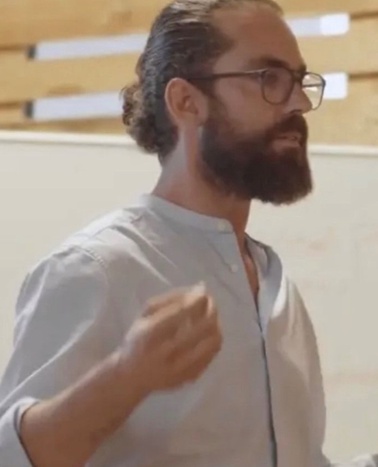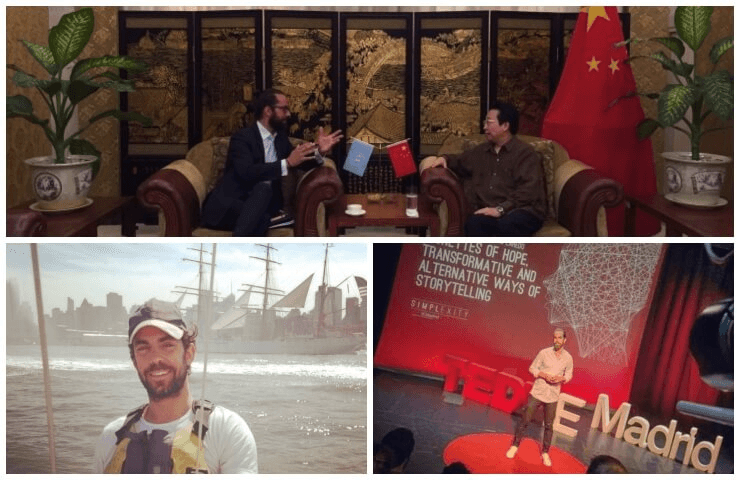
Miguel Alexandre Barreiro
My name is Miguel Alexandre. I’m Galician, and I grew up by Montalvo beach in the northwest of Spain, next to Sanxenxo, Pontevedra. I’m a Juris Doctor in Law and I have also achieved my PhD on social anthropology at the Sorbonne University in Paris. I have been working with the UN and development partners for most of my professional career, primarily in the areas of democratic governance, armed violence prevention and most recently partnership building and strategic communications. The island of Mallorca is now my home—and not by accident. I love the sea, surfing, kitesurfing, sailing and swimming... I need to be close to the sea. It’s my true passion.
“Opportunities aren’t always happening; you need to create those opportunities for yourself.”
The power of creating your own story
Miguel Alexandre is a globetrotter on a mission: to make a difference in the world, promoting sustainable partnerships focusing on conscious businesses and community empowerment. And he wasted no time in setting about it: immediately after university, he declined a promising job offer in Rome and headed instead to Addis Ababa in Ethiopia.
It was there that he had his first experience as a program officer, working with a small Italian NGO to help women in vulnerable situations. He was 23 years old at the time.
Miguel would soon have the opportunity to join the United Nations Development Program. It was the start of more than a decade during which he moved from Ethiopia to Somalia and from there to Lebanon, Mozambique and Central America, working with local partners, non-state actors, schools and communities, focused primarily on the prevention of armed violence.
It was a good friend and former colleague who suggested his skills could be put to better use in strategic communications. Realizing the opportunity this offered to widen the scope of his action, Miguel completed a specialization course at Columbia University’s School of International Public Affairs to learn more on this new area of work, and started working on what is still his main focus: building partnerships and creating alliances that enable the United Nations to support people on the ground. He started in Algeria, during the Arab Spring, and was then stationed in Cuba for three years.
In 2013, he was called back to the UN Headquarters in New York. This brought him much closer to the 2030 Agenda and allowed him to participate in consultations on democratic governance with different partners—not only governments and the private sector, but also people whose voices are often unheard: men and women in vulnerable situations, children, the elderly. It was a very fulfilling process that allowed him to build academic expertise on the concepts of empowerment, resilience and community-building.

Now, only four years later, Miguel is as busy as ever. He’s an Adjunct Professor of Persuasion & Ethics in the Master in Customer Experience & Innovation at IE Business School, and Professor of Community Empowerment in the Master in International Development. If that’s not enough, he’s also Professor of Partnerships, Management and Co-creation in the Master in International Relations and Professional Deontology at the Bachelor in International Relations at IE School of Global & Public Affairs, as well as being Director of the Policy Lab in Madrid and Segovia.
All the while, he has been working with the UN as a freelance consultant, spending half the year hopping from country to country wherever his expertise is required. He manages the UN’s strategic relationships with a number of key Member States, emerging partners and organizations within the private sector, corporate foundations and public institutions. His work attracts funding and technical support everywhere from Brazil to Mali to Kazakhstan—three or four countries every year, he estimates.
Miguel continues to work with the UN, and has been recently appointed as Partnership Building Advisor at the UN Economic and Social Commission for Western Asia (UN-ESCWA). But he cautions against anybody considering a career in international relations focusing solely on the big players. “It’s very important,” he advises, “that we don’t focus on just the UN or renowned corporations. We should first focus on the area we want to work in, then who we want to work for. NGOs, civil society organizations, governments, and today more than ever the so-called conscious corporations—anybody, really, has an opportunity to make a change. If you just think you want to work for the UN or a large corporation, you lose sight of why you wanted to do this and, more importantly, who you wanted to support with your skills.”
There’s no doubt Miguel’s career has reflected that view; it was wanting to work with communities that got him started with a very small NGO in a remote area of Ethiopia. It was only later that the UN came along and his career took on its globetrotting aspect. For Miguel, the most challenging part of being constantly on the move has to be not being able to be close to his family and friends or indulge in his true passion: the sea. Be it surfing, kitesurfing, sailing or swimming, Miguel needs the sea in his life “like a daily ritual.”
While growing up as a “Galician beach boy,” Miguel wanted to become an architect and environmentalist. Ultimately, he decided to put that dream on hold—although he still exercises his inner designer and activist streak through www.moeurs.org, the cultural and cooperative foundation he conceived in 2015 to promote the exchange of ideas, the spirit of learning and a constant search for inspiration through sustainable and local development.
Whichever field he went into, he knew he wanted his work to promote sustainability and community empowerment. Daring to take control of his own narrative, he created the opportunities to make this dream a reality. “In a society where rational argument is constantly challenged, you have to follow not what society expects from you, but what you believe you can contribute to empower your community and defend it with your values and skills” he concludes.
“Opportunities aren’t always happening; you need to create those opportunities for yourself.”